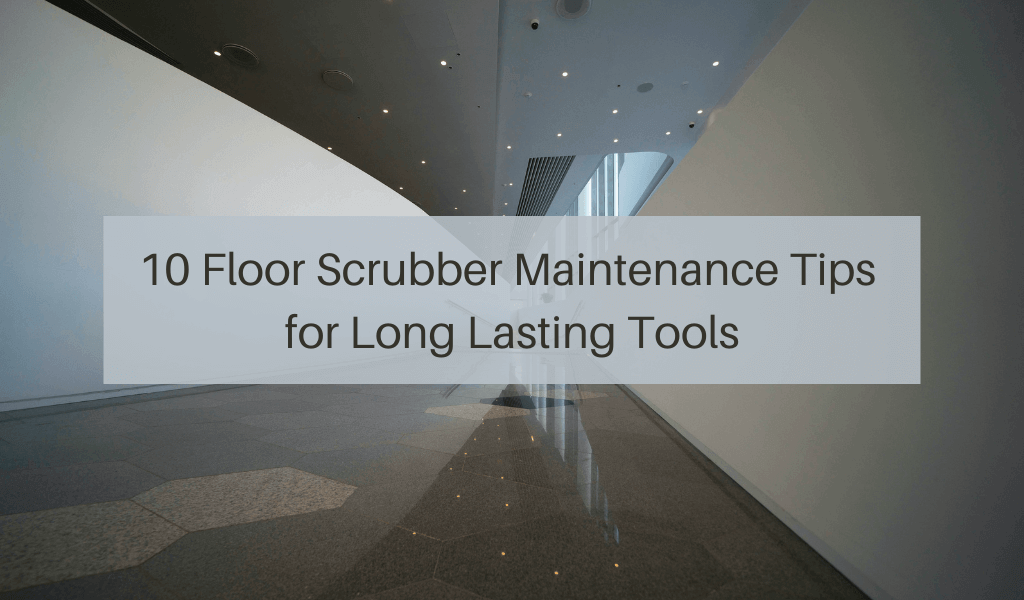Equipment maintenance is an essential part of keeping your commercial cleaning business running smoothly. That includes floor scrubber maintenance.
Keep your equipment well-maintained, and it will last longer, work better, and make more money for you. A floor scrubber maintenance plan is part of that. Any machine in good working order is more efficient and less likely to break down on you, leading to less downtime and fewer work interruptions.
Not just that, but unexpected breakdowns can cost you money, as well. Machine rentals or outright purchases aren’t cheap. Regular malfunctions could result in unhappy customers, too. Besides, do you really want to spend time going out to buy a new floor scrubber? Probably not.
Here are some floor scrubber maintenance tips that can help you get more life out of your machine.
If you are ready to bring your cleaning organization to the next level, take advantage of a free call with Janitorial Manager to see how our software can make you a more successful janitorial operation.

Floor scrubber maintenance: 10 tips to keep things clean and shiny
One thing to keep in mind is that any time you do floor scrubber maintenance, or any equipment maintenance, is that the machine needs to be unplugged. You don’t want to have your hand on a moving part that gets started accidentally. So again, always unplug your equipment before performing any maintenance.
1. Read the owner’s manual. There will be specific floor scrubber maintenance and operation guidelines in the manual for your machine. Different brands and styles will require slightly different approaches, so one of the best things you can do is read the manual and find out what the recommendations are for the machine you have.
2. Be easy on your machine. Your floor scrubber will do plenty of hard work, but one way to make it last longer is to go easy on it. Try not to jostle it around more than necessary and treat it like it’s vital to your business, because it is.
3. Clean the floor. Yes, your floor scrubber will clean the floor, but if you help it out ahead of time, you can keep your scrubber running longer. Give the floor a quick sweep or dry mop to get up any larger debris and dirt. Watch for any sharp edges or loose tiles that could damage your equipment.
4. Check the battery. Now we’re getting into some hands-on floor scrubber maintenance. Again, check your owner’s manual for the specifics, but you can look for signs of corrosion or leaking with any battery.
5. Check pads, brushes, and squeegee. Worn-out or dirty brushes and pads aren’t going to work the way they should. The same goes for squeegees. Clean these after each use and replace them as needed.
6. Clean and check tanks, hoses, filters. After each use, empty and clean the solution and recovery tanks, and make sure the filters and hoses are clean and clear. While you’re at it, check hoses and seals for any cracks or signs of wear.
7. Clean your floor scrubber. While it may not hurt your floor scrubber to have a few scuffs here and there, it is part of your overall presentation to customers. So as part of your floor scrubber maintenance routine, give it a good wipedown to remove any dirt, grime, or other marks.
8. Recharge the battery. Because different batteries have differing requirements, you may or may not need to recharge the battery after each use.
In addition to these daily tasks, there are some monthly floor scrubber maintenance items to add to your list.
9. Lubricate hinges and wheels. Use an approved lubricant on any wheel housings, as well as any chains and pivot points.
10. Clean and deodorize tanks and supply lines. Follow your owner’s manual for the specific instructions, but don’t skip this. Dirty tanks can get very smelly.
And, of course, remember that a floor scrubber maintenance plan is just one part of your overall equipment maintenance program. Keep your tools and equipment clean and they will work better and for longer, saving you and your team the frustration of going to use something only to find out it doesn’t work.
You can add these and other maintenance tasks to a schedule, too, so you don’t need to rely on your best guess as to when you last took care of these issues.
Clean up your cleaning business with Janitorial Manager! Sign up to learn more about managing work orders, inspections, employee performance, and so much more—all in a single app!

